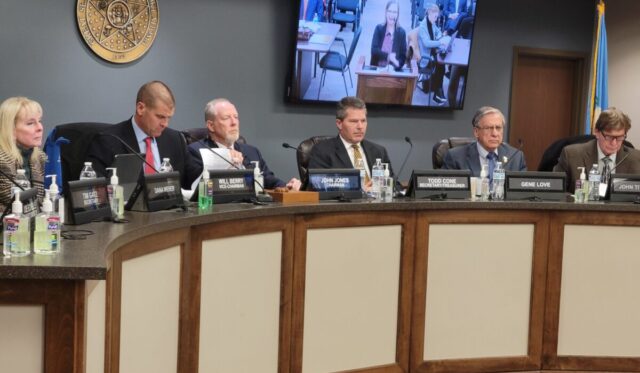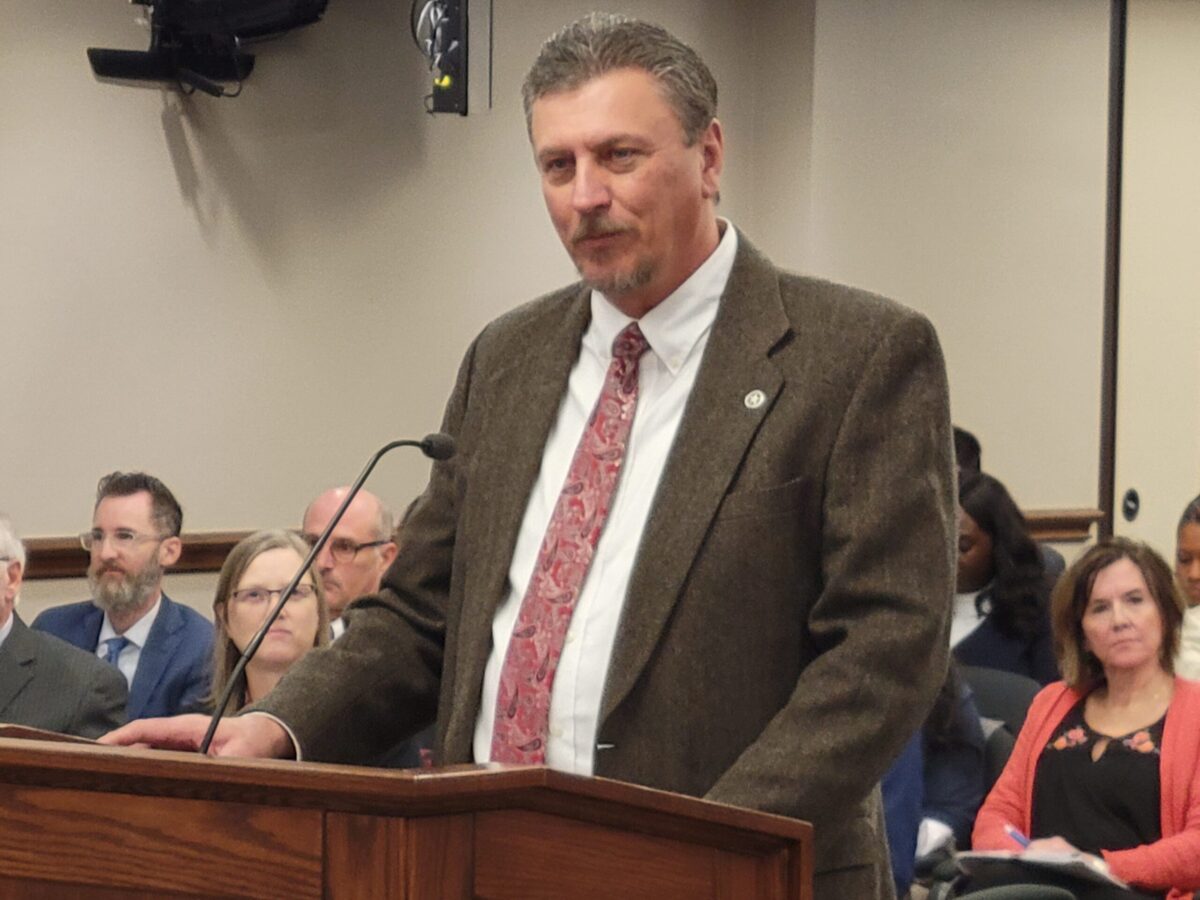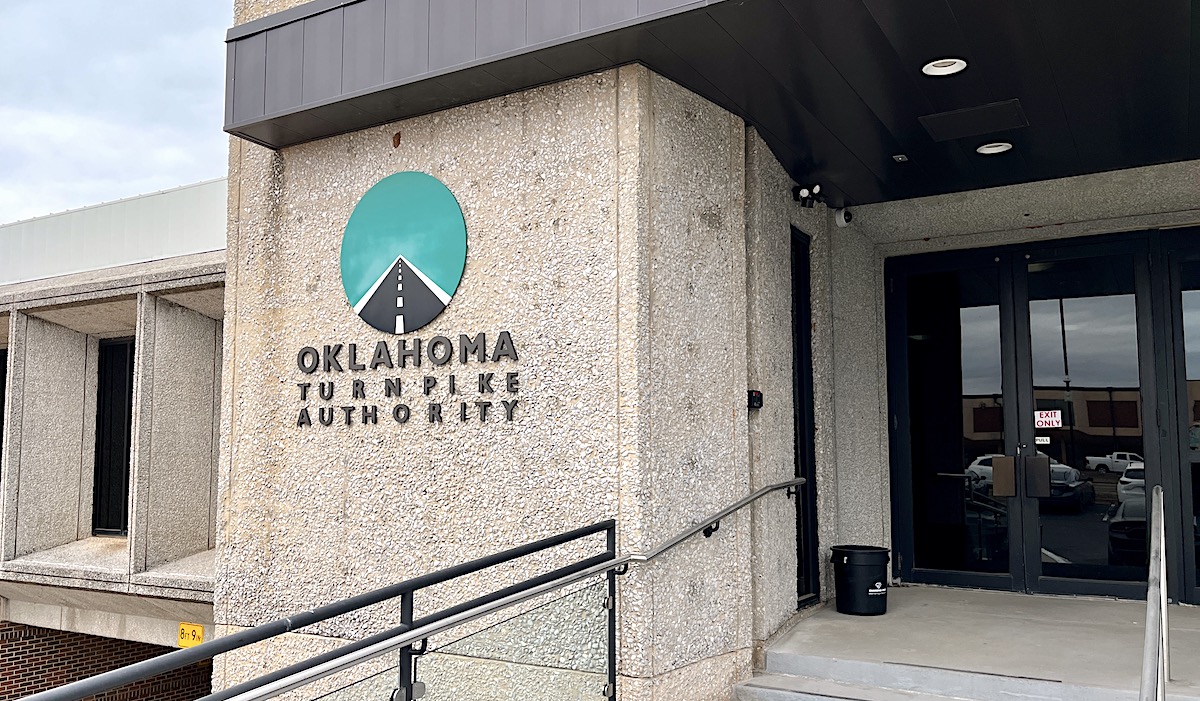

Saying the measure violates the Oklahoma Constitution’s separation of powers clause, the state Turnpike Authority’s governing board voted today to challenge a new law that gives the Legislature authority to make four appointments to the six-member board.
House Bill 2263, which was passed during last year’s legislative session and became law on Nov. 1, split the six appointments evenly among the governor, the speaker of the House and the president pro tempore of the Senate. Previously, all six members of the OTA board were appointed by the governor.
“We’re just looking for clarification,” board Chairman John Jones said.
Oklahoma’s governor has made all appointments to the board since OTA was created in 1947. Members serve eight-year terms, and current members will serve the remainder of their terms. Board member John Titsworth’s term expired in July. In December, Senate President Pro Tem Greg Treat (R-OKC) appointed Titsworth back onto the board.
Rep. Danny Sterling (R-Tecumseh) authored HB 2263 and said its purpose was to prevent one elected official — the governor — from controlling who is selected to serve on the OTA board.
“This scenario could create the situation of board members who would be selected to ensure that the governor would basically control the future turnpike projects,” Sterling said in a statement Tuesday. “One concern with this process is that it could potentially be a benefit financially in the future for who is serving as governor at any particular year. This could possibly be manifested in land and property investments that would be in the path of future turnpikes, that the general public would not be privy to.”
Sterling claimed he was not targeting Gov. Kevin Stitt, whose hard-charging style and heavy-handed actions with some appointed positions have rubbed legislators the wrong way in recent years.
“I am not directing this in reference to the current governor, and I am definitely not saying he would be involved in any unscrupulous business practices because of his control of the board members selection process,” Sterling said. “Again, I believe one person who could have singular control over the OTA board decisions could ultimately be problematic for our state now and in the future.”
New law ‘raises a shadow’ over OTA board

Tim Gatz, OTA’s executive director who received a significant raise Monday, said the board’s decision to pursue litigation should not be considered an adversarial action directed at the Legislature.
“This is something that has raised a shadow over the actions of the board, and we simply need clarity,” he said. “We need the question answered: Are we operating under a constitutional law or not?”
HB 2263 passed easily in both chambers: 41-2 in the Senate and 82-2 in the House of Representatives.
Stitt vetoed HB 2263 after its passage, but legislators overrode that veto and several others.
In his veto message, Stitt said the state constitution guarantees division of the powers of government, which shall not “exercise the powers properly belonging to either of the others.”
“Enrolled House Bill 2263 would shift the lion’s share of appointments to the Oklahoma Turnpike Authority, a non-appropriated entity, from the executive to legislative departments,” Stitt wrote. “Such a shift-from six members appointed by the governor to two members appointed by the governor and four members appointed by legislative leadership would codify legislative superiority and control over the operation of an executive branch agency and would enable the Legislature to exercise unconstitutionally coercive influence over the executive department.
“Simply put, although the Legislature declares policy, it cannot oversee the execution of the policy it declares.”
OTA members echoed the governor’s sentiment in their decision to challenge the legislation Tuesday.
“The Oklahoma Turnpike Authority’s statutory mission is to construct, operate and maintain turnpike projects that are specifically authorized by the Legislature,” Jones read from a statement after board members returned from an hour-long executive session to discuss the matter. “In other words, the OTA can only undertake projects that the Legislature sanctions. This mission is described in the OTA’s enabling legislation as an essential governmental function of the state of Oklahoma.
“The OTA’s board of directors is not an ‘advisory’ board. The authority members sitting before you today are a ‘governing’ board of an executive branch agency created to execute law passed by the Legislature, and a majority of our votes is necessary for any action taken by the authority, as evidenced by the items of business voted on and approved today. This is important work, and we take our responsibilities seriously.”
With HB 2263 now law, the Legislature eventually will have a majority of appointments to the OTA’s board as well as a majority of removal power, Jones said.
“That means the Legislature now has both oversight of the laws it passes as well as that of an executive branch agency charged with executing those laws,” he said. “The board has been advised by its attorneys that this violates the separation of powers doctrine and is therefore unconstitutional based on the legal test established by a 2002 Oklahoma Supreme Court case.”
A lawsuit will be filed in Oklahoma County District Court, Jones said. Board members decided to challenge HB 2263 because there is no room for uncertainty about whether the board is acting with proper legal authorization, he said.
“There are legitimate consequences when there is uncertainty about whether the board has acted with legal authorization, and it has the real potential to disrupt our essential functions,” he said. “This is not a hypothetical question. It is a genuine question as evidenced by a recent and painful litigation the authority has endured over the last year.”
OTA critics oppose board’s effort to overturn HB 2263

Lawsuits were filed during the past year challenging OTA’s ACCESS Oklahoma plan, ultimately delaying the sale of bonds to pay for new turnpikes and improvements to existing toll roads. In August, the state Supreme Court ruled in favor of the OTA, allowing work to proceed on the ACCESS program, which stands for Advancing and Connecting Communities and Economies Safely Statewide.
Opposition focused mostly on the ACCESS Oklahoma project’s south extension, which would run south from Interstate 40 near Newalla around Norman and into McClain County for the I-35 connection just north of Purcell. While proponents say the extension will be critical to divert commercial truck traffic and other travelers around the OKC metro, opponents claim the turnpike expansion would eliminate more than 600 homes.
Lawsuits filed by members of Pike Off, a grassroots opposition group, claim OTA was vague on early agreements related to ACCESS Oklahoma and violated the Open Meeting Act. The Supreme Court in May overruled a district judge who had found in December that the OTA had violated the Open Meeting Act.
Randy Carter, who is affiliated with the grassroots organization Oklahomans for Responsible Transportation that opposed the ACCESS program, said he is disappointed by the OTA board’s decision to challenge HB 2263.
“I think the Turnpike Authority is trying to circumvent the will of the Legislature to bring accountability and transparency to the Turnpike Authority board,” he said.
Carter said he helped Sterling draft language for HB 2263, saying the previous makeup of the OTA board made it difficult for members to oppose turnpike projects favored by a governor.
“Every one of those appointees are of the governor’s appointment,” he said. “That doesn’t seem to be an independent authority governing the turnpikes.”




















